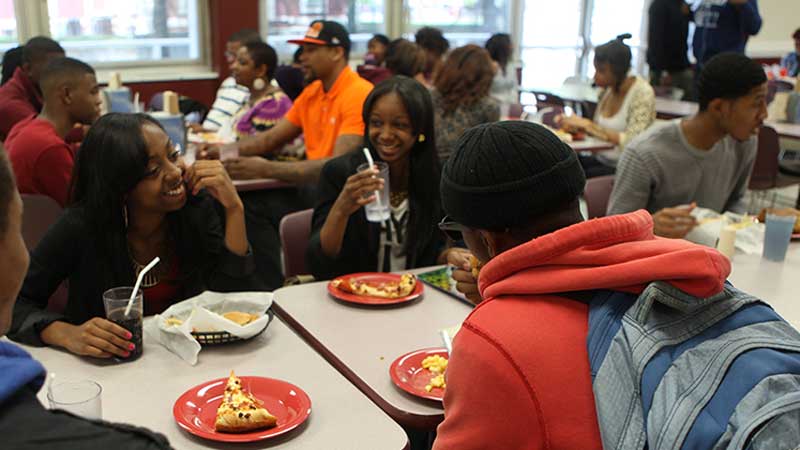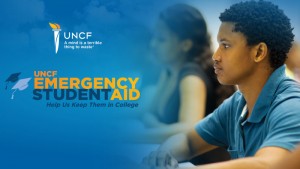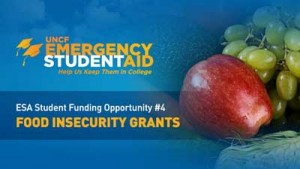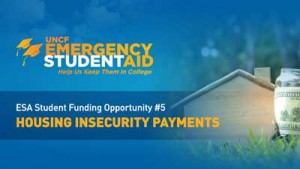UNCF Emergency Student Aid Program Helps Students Experiencing Housing and Food Insecurity

When going to college, just getting through the classes, learning and making the grades to be successful and earn your diploma is often daunting enough. However, with the cost of college rising steeply, some of America’s most promising students are now dealing with more than the usual college stresses of getting a degree. Many students on campuses across the country are facing basic needs like not having enough to eat or a place to live while they take classes.
At least 9% of students went at least one entire day during the last month without eating because they lacked money
According to the 2018 Still Hungry and Homeless in College Report, produced by researchers at Temple University and the Wisconsin HOPE Lab:
- 36% of university students and as many as 56% of community college students are food insecure at some point in their school year. Students say that because of a lack of money they skipped meals or cut the size of their meals, with 18% of university students doing this at least three days in the last 30 days. At least 9% of students say they had gone at least one entire day during the last month without eating because they lacked money.
- 36% of university students were housing insecure in 2017. Roughly 4% of students from four-year institutions claimed they had been thrown out of their home.
- 9% of university students were homeless in 2017. In comparison, 12% of community college students were homeless in 2016, and 14% in 2017. Some homeless students couch surf or stay with friends; others live in shelters, automobiles, abandoned buildings, or outdoor areas. A common bond between these students was not “not knowing where you were going to sleep, even for one night.”

You can help
Your donations to UNCF’s Emergency Student Aid program can help UNCF-member HBCU students handle an emergency that can mean the difference between staying in school and dropping out.
What are “basic insecurities?”
The researchers reported that basic needs insecurities are common among both low-income students and moderate- to middle-income students. Moreover, the hidden costs of college, often not covered by institutions meeting “full need,” are key contributors to these challenges.
These students are not “lazy.” They often work full- or part-time jobs while enrolled, and they probably receive some type of financial aid for their school costs. Some of the students come from foster care and age out of assistance before they graduate. (More than 60% of former foster youth who completed the research survey were food insecure and housing insecure, and almost 1 in 4 had experienced homelessness in the last year.)
36% of university students were housing insecure in 2017
Some may have left home because of situations that made them feel unwelcome or unsafe. “Even with these challenges, our study finds that students experiencing basic needs insecurity exhibit similar levels of commitment to college as their peers who are not basic needs insecure, spending as much time in school and studying. There is not much evidence to suggest that they are irresponsible,” said the HOPE Lab researchers.
The common bond between homeless students was “not knowing where you were going to sleep, even for one night.”
What are schools doing?
Many schools across the country are attempting to address these insecurities. According to The Student Government Resource Center and The College and University Food Bank Alliance, more than 200 colleges and universities have established on-campus food and toiletry pantries to serve students, and the number is growing.
Johnson C. Smith University, North Carolina
Phasing Up to New Possibilities program celebrates ten years
The program, which launched under the administration of former JCSU president Ronald L. Carter, was designed to assist aged-out foster students during their time on campus. Today, the program also assists students who are homeless or facing homelessness.
Spelman College, Georgia
Spelman College supported through meals, funding, food pantry, and more
Spelman College, a women’s HBCU in Atlanta, Georgia, provides a variety of supports for students facing financial issues.
Savannah State University, Georgia
Some College Students Facing Homelessness, Hunger Around the Holidays
More than 30 homeless students and former foster youth are served by the university’s Students That Are Rising or S.T.A.R. Program.
How can you help?
 UNCF is working to help the students it supports with unexpected financial hurdles. UNCF’s newly-expanded Emergency Student Aid (ESA) program helps HBCU students with a myriad of funding emergencies, including food insecurity grants, in the form of credits to their school accounts, to underwrite dining hall meal plans for a specified amount of time or meals as determined by the institution.
UNCF is working to help the students it supports with unexpected financial hurdles. UNCF’s newly-expanded Emergency Student Aid (ESA) program helps HBCU students with a myriad of funding emergencies, including food insecurity grants, in the form of credits to their school accounts, to underwrite dining hall meal plans for a specified amount of time or meals as determined by the institution.
 ESA also addresses housing issues with assistance to UNCF-member HBCU students who need support for housing, helping to cover expenses such as on-campus housing, rent and utilities, security deposits, short-term hotel vouchers during extended school breaks, etc.
ESA also addresses housing issues with assistance to UNCF-member HBCU students who need support for housing, helping to cover expenses such as on-campus housing, rent and utilities, security deposits, short-term hotel vouchers during extended school breaks, etc.
Your donations to UNCF’s Emergency Student Aid program can help these and other UNCF-member HBCU students handle an emergency that can mean the difference between staying in school and dropping out.